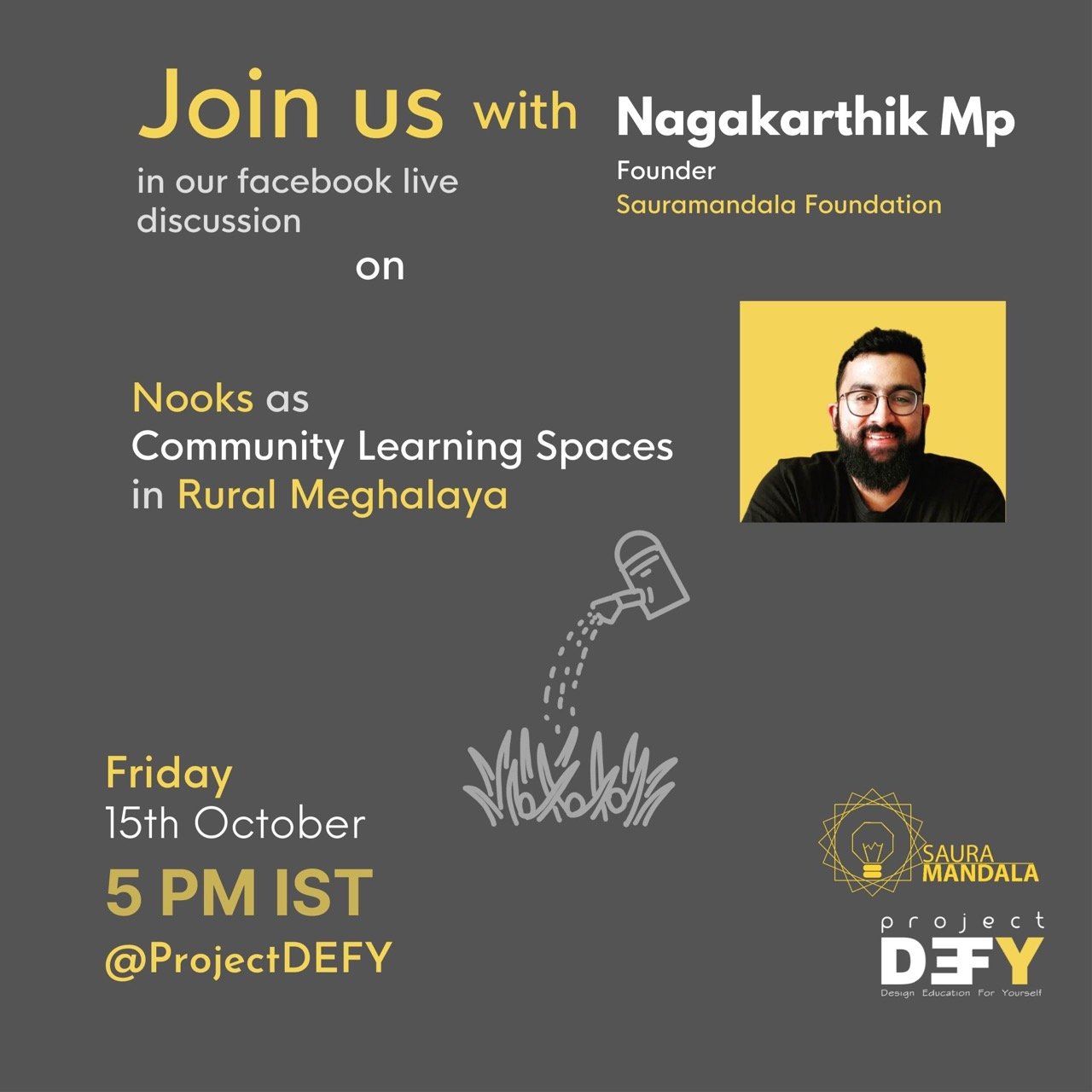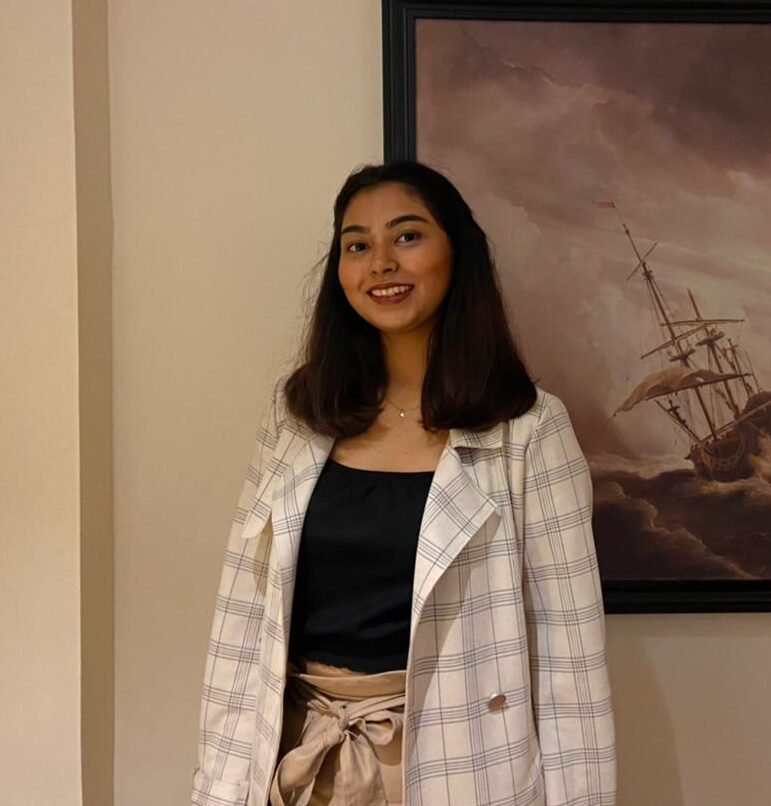
Kareena is currently pursuing master’s programme in Social Work from Tata Institute of Social Sciences Chennai, India. As a social worker, she has interest and experience in working with communities in the past. She wanted to be a part of DISPECS as it is giving her the opportunity to contribute to the design of a segment from planning to implementation. She is supporting the Mental Health segment.

Shadwal is currently pursuing the bachelor’s programme in Physical Planning from School of Planning and Architecture Delhi, India. He aspires to get hands-on experience in disaster preparedness and management for marginalized communities and apply his learnings from college on live projects. He is supporting the Search, Rescue and Safety segment in DISPECS.
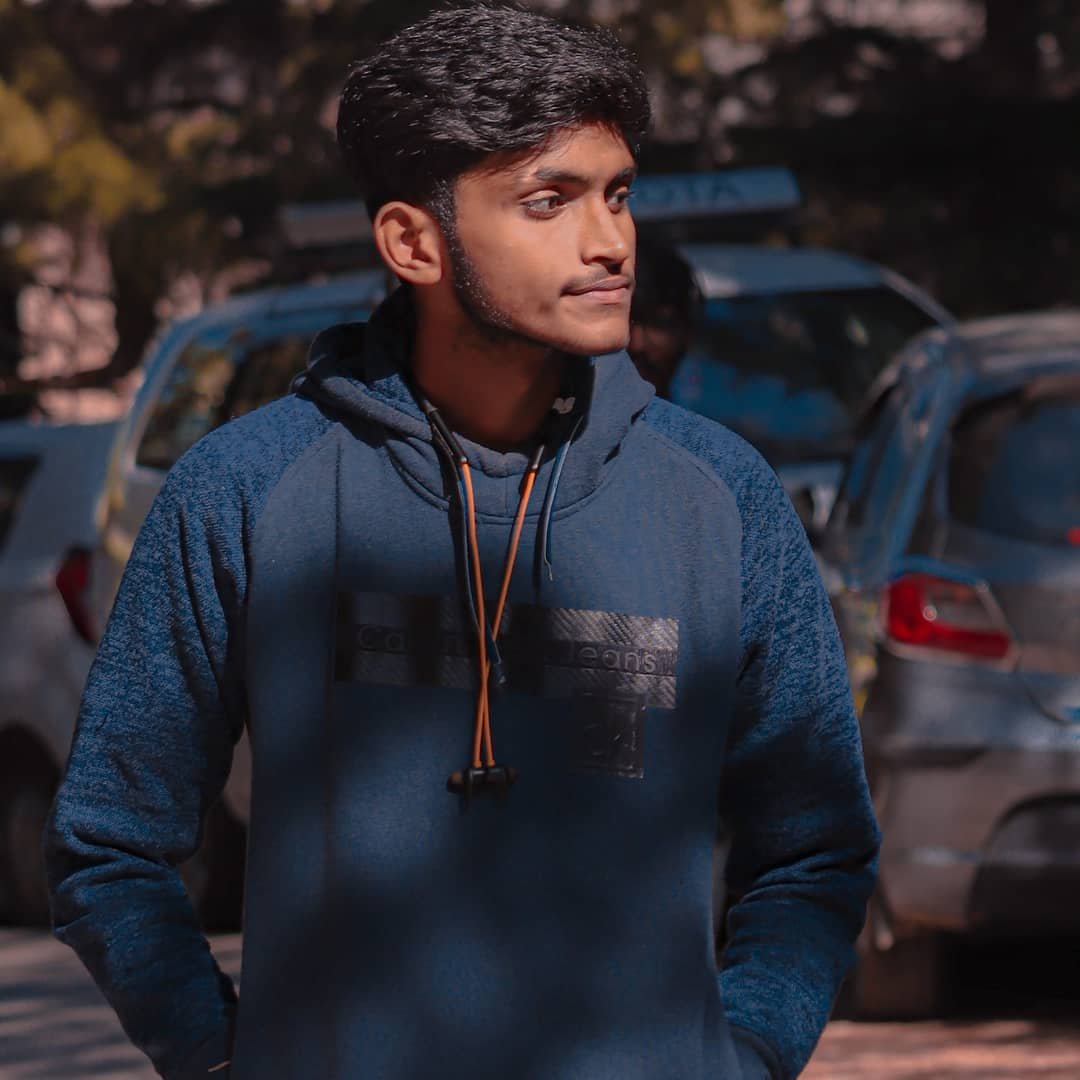
Koushik is currently pursuing the bachelor’s programme in Physical Planning from School of Planning and Architecture Delhi, India. He wants to gain an in-depth understanding of disaster preparedness and management. He aspires to utilize the knowledge and experience from this project throughout his personal and professional journey. He is supporting the Search, Rescue and Safety segment in DISPECS.
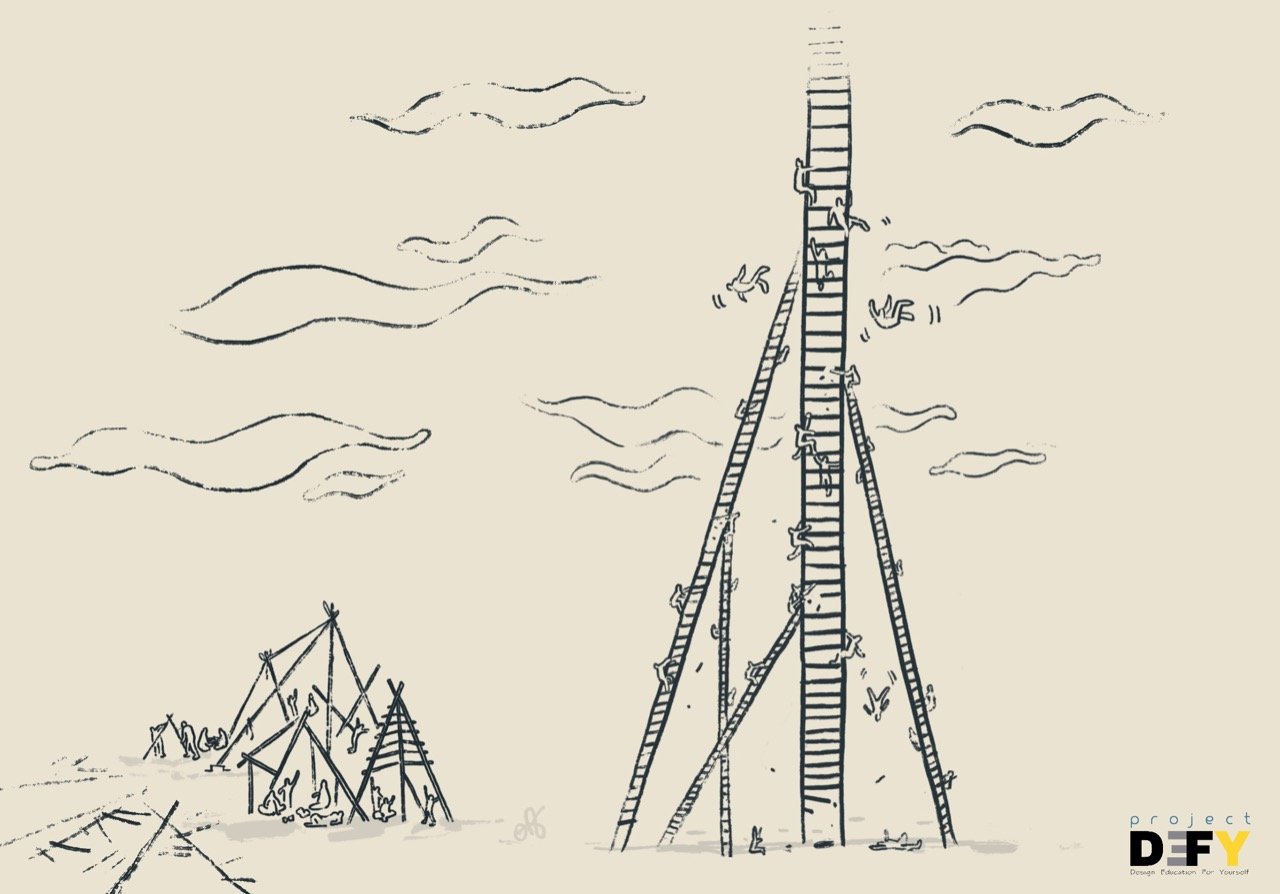
It is no surprise that we’re witnessing one of the biggest turnovers of what defines human value and its methods or perception of ‘educating’ in history, for all that stood for schooling (information holding and dissemination) is smoothly being taken over by memory chips and the internet. Existing school and college systems are largely at stake of losing all relevance, as collaborative capacities, run for initiatives or instant thought becomes far more valuable than degrees. And as our digital seconds tick, we are closer than ever to realise the futility of the mindless competition and egocentric ideas of ‘success’ our colonised minds have so long adhered to. To such an extent, that we feel completely lost and miserable without a given goal or a checkpoint, probably a hangover of the slavery under the British rule.
Not that we’ve completely gotten out of it, or that the numbness of an enslaved mind has left us, but we surely have started questioning our ideas of ‘success’ and ‘necessities’.
Experimentations and re-evaluations in education, at least in India, have been ages old. But for relatability and a counter colonial narrative, we can go back to 1920’s; when a resourceful and acknowledged figure (in the world of literature and otherwise) tired with the factory model of classroom schooling, decided to have classes under open skies and banyan trees, with complete interdisciplinary courses which continue till date. And no wonder it brought out few of the most diverse and acknowledged minds in the world of cinema to the world of economics. Rabindranath Tagore, thus, can be taken as one of the foremost examples of those in India who pioneered experiential learning, with symbiosis and self-realisation as core values, countering the absurd idea of British schooling (which were no more than prisons training ‘well behaved’ clerical slaves).
There were several others including Mahatma Gandhi (idea of swaraj), Sri Aurobindo (Auroville) who have tried to, and to certain extent have, successfully established spaces and ideas of exploratory and experimental schooling, and a human society where growth and thought are driving factors. It is a mind-boggling phenomenon, however, to see ‘globalisation’ cause such an impact, that even after seventy years, people are still being sold mono-cultured and linear ideas of success, where it is an imaginary ladder to climb, while ensuring that others are left behind. And the only way to climb that ladder is with an IIT certificate, without which one might as well imagine a deadbeat existence. If we care to reimagine the world, we must look beyond the usual faces of success, the famous CEOs and Billionaires and Investment Bankers, and find new ones that have succeeded in life differently.
Jail University, Udaipur
The inmates here, at the Central Jail of Udaipur, try to explore activities which are close to their hearts, discovering a sense of freedom during their time in prison. This includes a variety of things, from permaculture to theatre to painting, through a wonderful program called Jail University. One of the faculty-inmates for the program, began his journey at the jail six years ago, when according to him he, along with his father and grandfather, was falsely accused of a crime and sent into prison. Following an intensely difficult phase and getting a lifelong sentence, on the verge of giving up, he found painting to be his companion and guide through the program. From intricate drawings for drawing books to painting murals on walls, he found his calling. Took him nine months to master his craft, and some amount of resilient faith to start passing it on to twenty other inmates, who plan to continue it professionally when they get out. This program aims at shifting the societal outlook of imprisonment, punishment and crime to a more inclusive process of lifelong learning and a journey of finding one’s true calling.
HIAL (Himalayan Institute of Alternatives, Ladakh) and SECMOL
The name of Sonam Wangchulk rings a familiar bell after the popularity of how the success rate of matriculation results in Ladakh’s villages took a sharp increase within a decade of introducing SECMOL (Students Educational and Cultural Movement of Ladakh). A program introduced after he worked together with the government and villagers into making the school curriculum more relatable and inclusive of local culture. For those still struggling to cope up, he introduced this alternate school, HIAL, which takes learning to its core, making it fun, hands-on and experimental. From agriculture to eco-friendly buildings to starting campus radio or newspapers, this place could be a live example of what a community of solution builders, rejected by the generic schooling systems could accomplish, given an inclusive space. For more specific examples, we could consider two of the learners who had earlier failed their matriculations repeatedly four to five times. One went to become a top journalist and later education minister, while another a renowned filmmaker with multiple awards. Thus, the examples of those rejected by conventional institutions blooming at the chance of necessary and adequate spaces are endless.
JP Nagar Nook, Bangalore
Another such story which can’t go unmentioned would be that of Niah, and her ongoing journey of exploration and self-directed learning, from JP Nagar nook. For those unfamiliar with nooks, these are physical self-learning spaces within communities, where learners of all ages and genders can come together, explore and learn through projects of their choice. Niah, left her school after 12th and got married early, to a household where she wasn’t allowed to do much outside household work. She discovered the nook while coming to drop off her sons, only to find out she equally belonged to this space. A space without any teacher, a strict code of conduct or exam, one where you could simply be. Laptops and the internet opened a whole new world for her; she started learning English and the possibility of exposure immensely boosted her confidence. She is still figuring out how to use her newly acquired skills but is glad to have found a voice and not be constricted in the household anymore.
There are endless examples of such journeys, where young and creative minds, rejected by social structures of schooling and education, have flourished the moment they have found enough space to ‘grow’ and to ‘be’. From Albert Einstein to Thomas Edison to Leonardo Da Vinci, we could keep looking at known figures who made a positive shift in the course of humanity but were seriously rejected by their schools and teachers.
That brings us to a very basic question – Can a student or person ever be a ‘failure’? Or is it the school which fails when it labels its student as ‘failure’?
In fact, what kind of a society is evolved, if it’s idea of nurturing is based on exclusion? It is like choosing the plant which is already in full growth and bloom, and providing it with more food and water, taking credit for its growth. No wonder the gap between the richest and poorest, economically, and culturally, has only been ever increasing. No wonder linear ideas of growth and success are devouring all possibilities of diverse thought and solutions, with every bit of human essence left in them. We’ve already lost touch with most of our cultural roots and the mind-boggling diversity they held, their crafts and knowledge, mostly vilified by schooling systems.
Since we are at the verge of a major crisis which is ecological, economical, educational, societal and political, it is a good time to think about taking a small pause; rethink our ideas of success, growth and happiness and ask ourselves, ‘if everything around us appears to be ‘garbage’ or ‘failures’, who or what has really ‘failed’ ?
Then, we can hold up these existing stories, which took the courage of going beyond the norms, giving curiosity, imagination and the human ‘being’ a chance; and use them to inspire enough such stories and spaces, that they fill up this existing void of neglect and rampant rejection.
For what use is a school of, if it doesn’t know how to include and create enough space, for each to grow?
About the author
Archisman is an explorer and storyteller with special interest in the impact of visual design and architecture in everyday life. He likes painting walls, listening to teatime stories and working with organisations or communities aiming for a more conscious, symbiotic future.
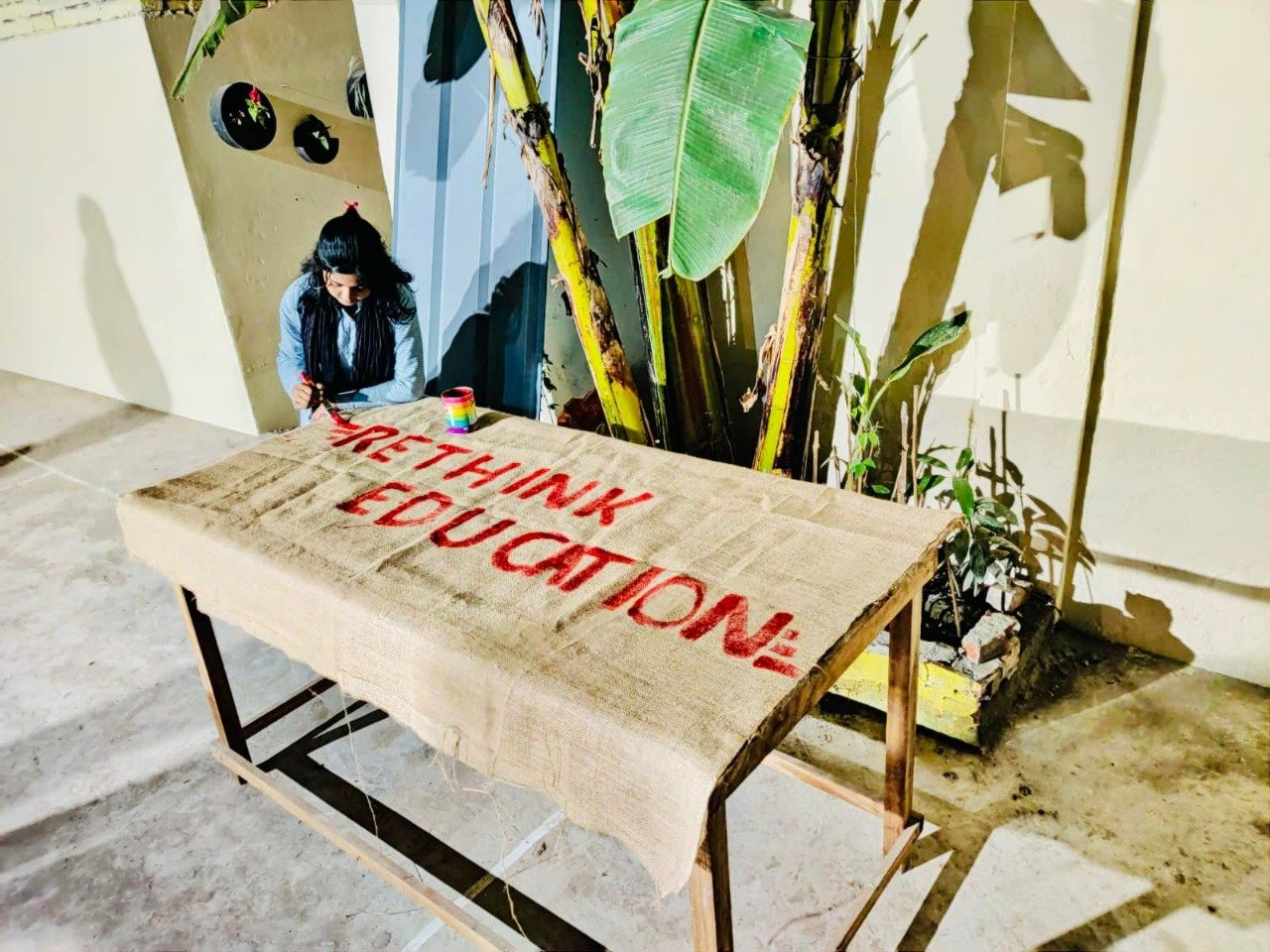
“There can be no contentment for any of us when there are children, millions of children, who do not receive an education that provides them with dignity and honor and allows them to live their lives to the full.”
– Nelson Mandela
As a society, we all consider education as a tool of empowerment, growth and development for the communities and nation as a whole. School, colleges and universities as an agent of education are seen as the ‘great equalizer’ of income, wealth and historical inequalities or injustice between different communities, poor and rich, men and women. Education has become the ultimate solution to all of the problems in our societies. Through the right based approach, education has become the priority of many governments, civil societies and NGOs. The present education system promises so many things; reducing poverty, gender equality, social or inter-generational mobilities, skilled workers etc. It also promises to solve various problems like unequal access to different institutions, climate change, etc.
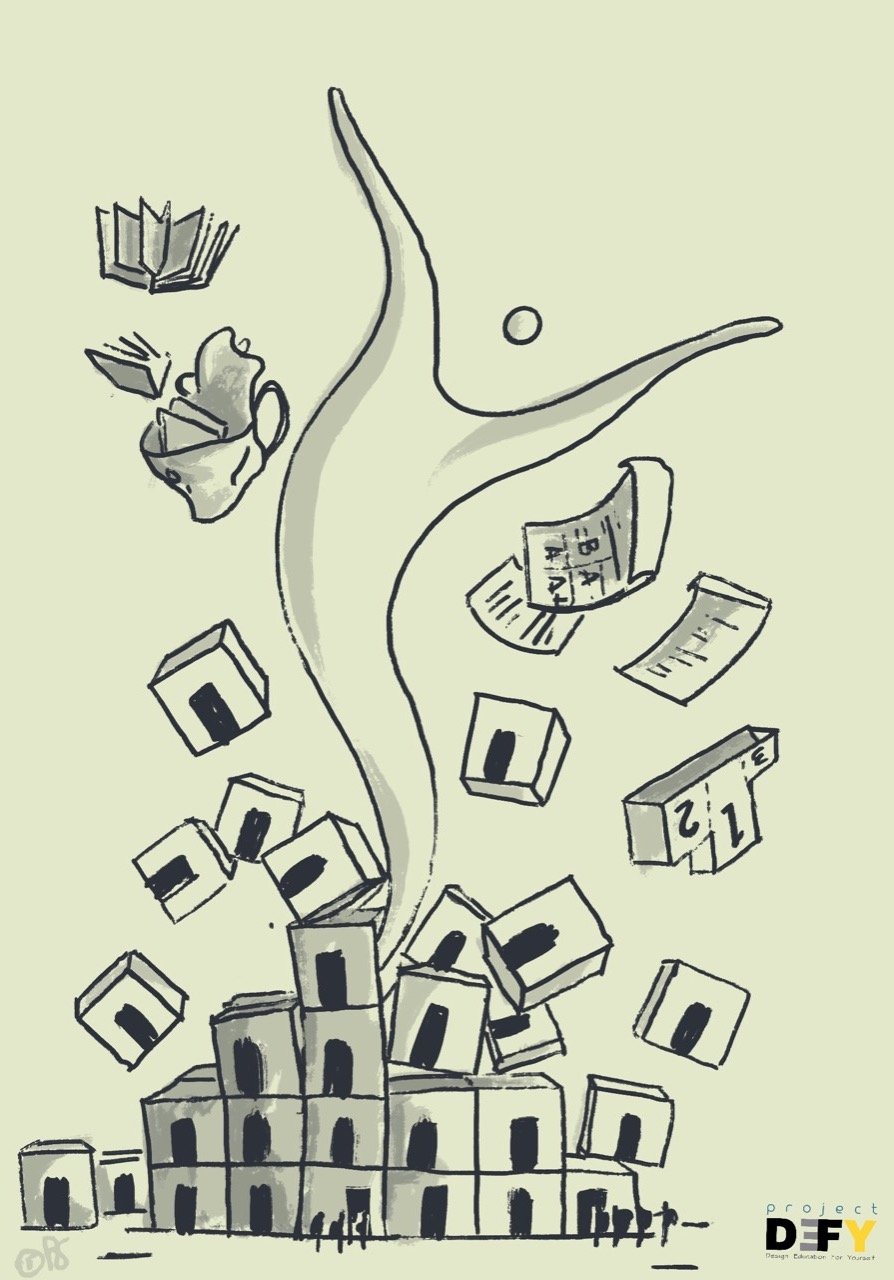
For centuries School Education has been granted the status of utmost good, the most benevolent task for humanity – to educate its children to continue the world. It is undeniable that children do grow to become the future of society, of humanity and of the planet. However, what are the parameters that we are setting for ourselves and for this education? What lens are we willing to use to measure the worthiness of the placement of the modern education system at the pinnacle of human good?
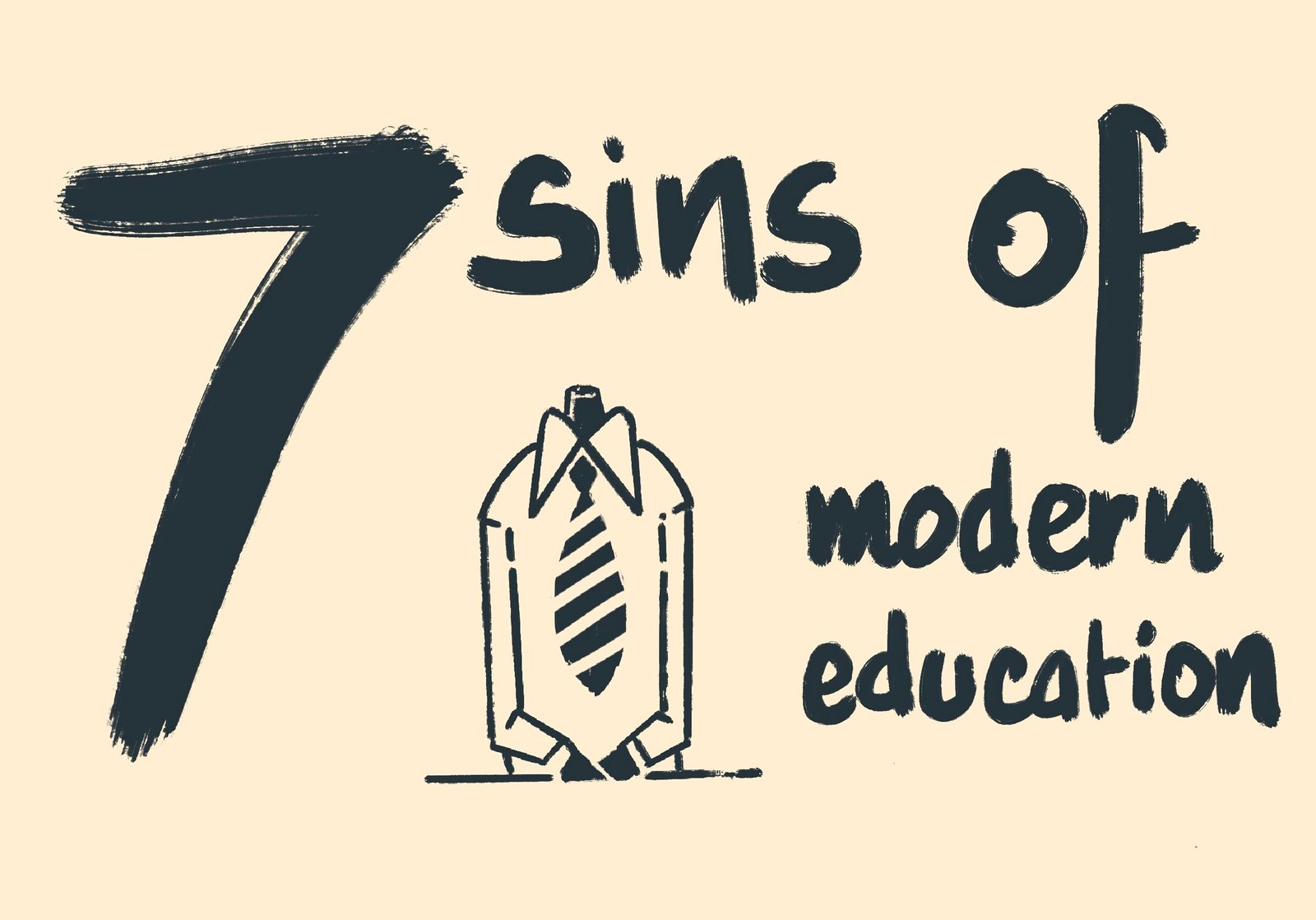
The word ‘education’ rings different bells for different age groups of people. And if one cares to ask those who are getting educated , one thing that would be clear is – it’s definitely not an enjoyable process. Maybe that’s one of the factors that have contributed to a generation of frustration and compulsiveness, feeding on mass produced opinions and judgement, losing everything that is human. What was to be an exploration leading to evolution, growth and mindful symbiosis has merely become a painful training process to yield lifeless consumers who can be put under formulae, assessed and controlled, thus becoming forever dependent on an external entity.
So as an organisation working towards building conscious spaces for self sustainable community learning, where learning is fun and empathy is more than a moral science topic, we consider it an immediate responsibility to uncover the face of existing education system and call out the sins it has committed on the human essence, one by one.
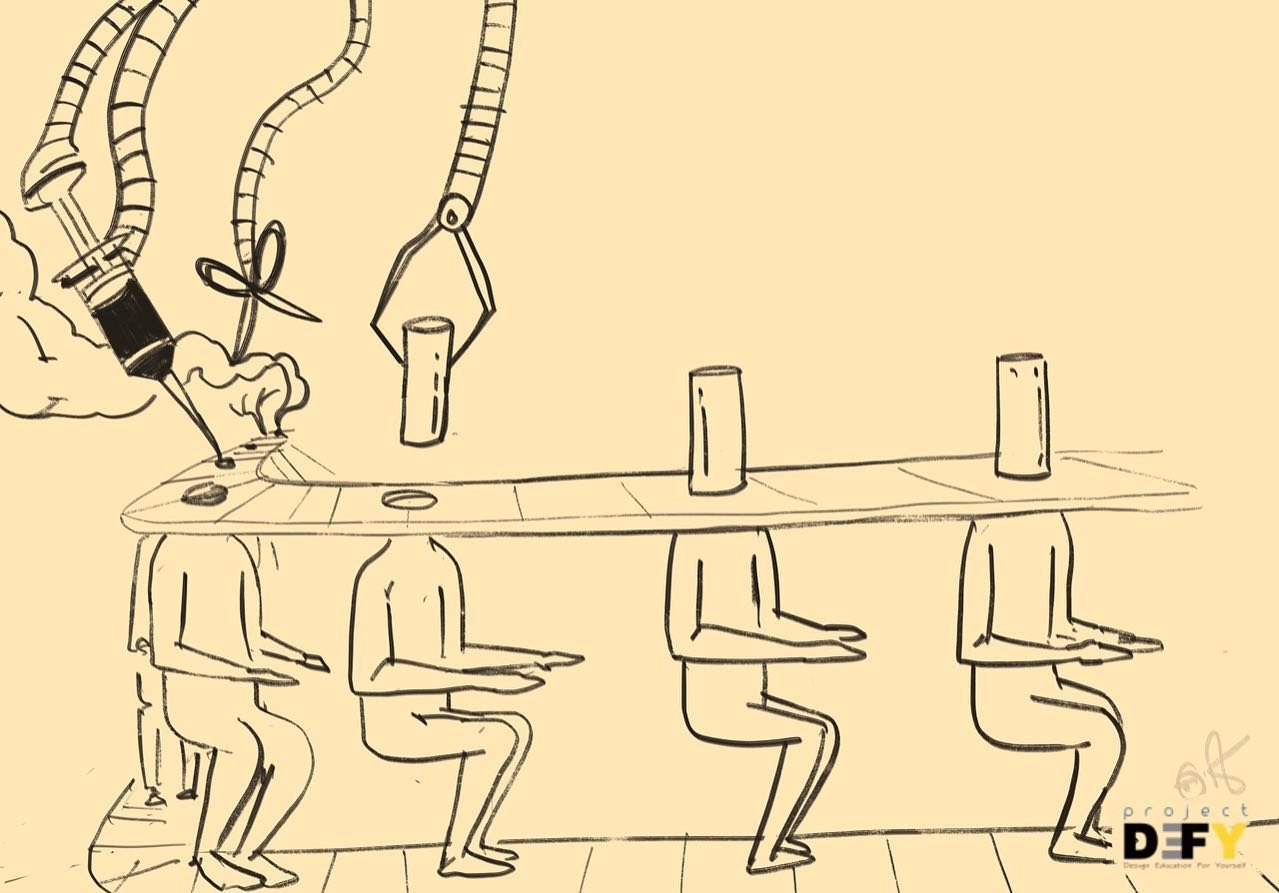
If you design a system with certain features to do certain things, don’t be surprised if it does it.
Ken Robinson
Large-scale public education did not exist before the 19th century, and it only came into existence with the purpose of supplying human labor for the industries that were coming up. Hence it is based on the principles of industrialism and conformity. So, are the rosters, ringing of the bells and uniforms, glaringly similar to a factory setup. Over the years with the exploding population and growing demand, the education system started inflating, so the governments all around strangled the same systems with standardized testing, which increased the competition and added a layer of horse blinders on both the teachers and the students, just to churn out the best results out of a misleading system.
Today we demand creativity and innovation in every aspect of our modern world, and these expectations have been backtracked and reached the schooling system. Today schools are expected to nurture creativity among children and lectures on innovation are given in every business management school. Well, in defense of schools these expectations are just unfair. Schools aren’t designed to nurture creativity, it was designed with the exact opposite values of compulsion, competition, monoculturization, and decontextualization of humans from their own environment.
Creativity in simple words can be defined as having new ideas of value. And when one acts upon these ideas to create something, we call it innovation. Creativity and innovation, like any other skill comes with practice, it’s a habit that one builds over the years to look at things differently, to think more often of different possibilities, by gaining knowledge from interdisciplinary fields, and by trying to build these different ideas into reality.
Schools not only do not nurture these skill sets, but restrict every strand of these muscles to grow within individuals by not giving them the space to think differently. Every student is supposed to study the exact same syllabus whether they like it or not, with the parents and teachers holding a hierarchy of subjects, where mathematics & sciences are on top, followed by languages & social studies and at the end comes humanities. On top of that, Individuals in schools are not allowed to make mistakes, as the one making mistakes is punished, shamed or asked to buckle up and perform in the manner that is expected by the education system.
In my personal experience of being and working with children, I have seen that children are already creative by themselves, they are not afraid to try out new things, they carry their own worldviews, and are wanting to create things that they would like to see for themselves. As Picasso once said – “Every child is an artist, the problem is how to remain an artist once we grow up.” Schools play a fair share in causing this problem by restricting every individual from carving out a life for themselves as they might want to and by adding the weight of shame and fear which people carry all their lives. Well, sometimes the solution to the problem is not causing it and trying something different.
About the author
Muzamil approaches life with zest and with an innate need to explore different ideas. His beloved subject is himself and the people around him. Driven by freedom of choice he is working with Project DEFY, as a creator of self-designed learning spaces in different communities locally & internationally.
Facebook Live- Nooks as Community Learning Spaces in Rural Meghalaya
Our latest Nook at Sohrarim in Meghalaya has been garnering a lot of attention (for the right reasons ofcourse!). So we decided to decode things in our upcoming Facebook Live with Nagakarthik Mp, Founder, Sauramandala Foundation, our partners for the Sohrarim Nook.
We will talk about Education in Meghalaya and unnoticed challenges of the North East and how Nooks as community learning spaces can bring about a paradigm shift in rural Meghalaya.
Tune onto our Facebook page on Friday, Oct 15, 5PM IST.
https://www.facebook.com/ProjDEFY
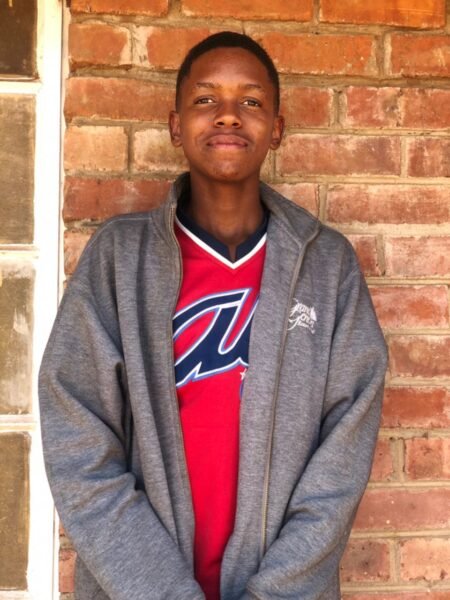
Nook: Bulawayo
Learner Name: Thamsanqa Sibindi
Month & Year of Story: October 2021
Probably most of us frequently use a food app to get our favourite dishes delivered at home. While in big cities, food delivery services have become something taken-for-granted, rural areas most often lack such services. This also means that local food shops and restaurants miss out on potential customers and revenue, while the customers are left craving for their favourite food or have to travel long distances to get it. 17 years old Thamsanqa from Nkulumane, Zimbabwe, saw this not only as a lack in his local community, but also as an opportunity to learn new skills and become an entrepreneur at the same time. As such, he is currently working to build Nkulumane’s first-ever mobile food delivery app.
Thansanqa’s dream is to become a professional software developer. And what better way to become one than not only learning coding and programming skills to build his app, but also develop entrepreneurship skills to make it into a profitable venture from which he can make an additional income for himself and his family? This is precisely what the teenager sets out to do at the Bulawayo Nook.
He says that he never thought there would be a place like the Nook in his local community – “a fun place where you learn by yourself rather than being taught. We all encourage each other to learn and never give up.”
That the Nook is enabling him to start a business and also come closer to his dream of becoming a software developer shows Thamsanqa that “owning a degree is not the only way to prosper and achieve your aspirations.”
- « Previous
- 1
- 2
- 3
- 4
- Next »

